WHAT IS THE DIFFERENCE BETWEEN THE WYOMING SUPREME COURT, DISTRICT COURTS, CIRCUIT COURTS, CHANCERY COURT AND MUNICIPAL COURTS?

The Wyoming Supreme Court is the highest level of court in the state and its decisions on issues of state law are final. It hears appeals from district court decisions and petitions for extraordinary relief from lower court decisions.
The district courts hear felony criminal cases, civil cases where more than $50,000 is sought, juvenile matters and probate matters. They also hear appeals from lower court decisions. The work of the district courts includes trials in the most serious cases. There are 23 district judges, organized into nine judicial districts.
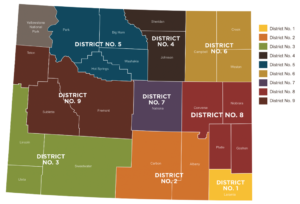 There are circuit courts in all 23 counties within the nine judicial districts. Circuit courts hear all misdemeanor criminal cases and civil cases where less than $50,000 is sought. Circuit courts also hear family violence, stalking, and forcible entry and detainer cases. The circuit courts may set bail for people accused of crimes, and conduct preliminary hearings in felony cases.
There are circuit courts in all 23 counties within the nine judicial districts. Circuit courts hear all misdemeanor criminal cases and civil cases where less than $50,000 is sought. Circuit courts also hear family violence, stalking, and forcible entry and detainer cases. The circuit courts may set bail for people accused of crimes, and conduct preliminary hearings in felony cases.
On March 15, 2019, Governor Gordon signed into law an act of the 2019 Wyoming legislature creating a Chancery Court, whose purpose is to provide a forum for streamlined resolution of commercial, business, and trust cases. The act establishes a court with jurisdiction to decide actions seeking declaratory or injunctive relief and actions seeking money recovery over $50,000 that arise from claims including breach of contract, breach of fiduciary duty, fraud, derivative actions, the Uniform Commercial Code, and the Uniform Trust Code. The Wyoming Supreme Court adopted final rules for the Chancery Court on September 21, 2021.
Municipal courts operate in some incorporated cities and towns. Municipal Courts are not state courts and only have jurisdiction over issues involving municipality’s ordinances. A municipal court judge may assess penalties of up to $750 and/or six months in jail. Decisions in Municipal Courts may be appealed to the District Courts. Municipal court judges are generally appointed by the mayor with the consent of the municipal council. The municipality sets their terms. Most municipal judges are part-time positions and many are lawyers.
Sources
HOW ARE JUSTICES/JUDGES CHOSEN IN WYOMING?
Supreme Court justices, district judges, circuit judges and chancery court judges are chosen through a merit selection process. The Judicial Nominating Commission screens and interviews applicants for each judicial vacancy. Then it recommends three qualified candidates to the Governor. The Governor chooses one person from those three candidates to fill the vacancy. Both attorneys and non-attorneys serve on the seven-member Judicial Nominating Commission.
Sources
- Const. art. V, § 4.
- Wyoming Judicial Branch, Judicial Nominating Commission
- Rules of the Judicial Nominating Commission of the State of Wyoming
- John M. Burman, Ethically Speaking “The Ethics of Requiring Retirement at Age 70 for Some Judges in Wyoming” Wyo. Lawyer., October 2009, at 44, 45.
WHAT ARE JUDICIAL RETENTION ELECTIONS?
After having been selected by the Governor to serve as a justice/judge as described in FAQ #2, Wyoming law requires justices/judges to periodically appear on the general election ballot and stand for retention by a vote of Wyoming citizens. Judicial retention elections are non-partisan. This means that a justice/judge does not run “against” anyone and is not allowed to campaign unless there is active opposition to his or her retention in office. Retention elections are intended to focus on the professional competency of Wyoming’s justices/judges rather than the popularity of individual decisions. In a retention election, voters decide whether a justice/judge should be retained or removed from office. If a justice/judge receives a majority of “yes” votes, he or she serves another full term. If a justice/judge receives a majority of “no” votes, he or she is removed from office at the end of the year.
Sources
- Const. art. V, § 4(h) (“[I]f a majority of those voting on the question vote negatively to any judicial candidacy, a vacancy will thereby be created in that office at the end of its existing term.”).
- Const. art. V, § 4(g) (“The electorate of the whole state shall vote on the question of retention or rejection of justices of the supreme court, and any other statewide court; the electorate of the several judicial districts shall vote on the question of retention or rejection of judges of their respective districts, and the electorate of such other subdivisions of the state as shall be prescribed by law shall vote on the question of retention or rejection of any other judges to which these provisions may be extended.”).
- Stat. Ann. § 5-9-109 (Circuit judges “shall, at such general election, stand for retention in office throughout the circuit as provided in article 5, section 4, of the Wyoming Constitution.”).
- Wyoming Code of Judicial Conduct, Rule 4.2(B) (“A judge who is a candidate for retention in office shall abstain from any campaign activity in connection with the judge’s own candidacy unless there is active opposition to his or her retention in office.”).
WHY DOES WYOMING HAVE RETENTION ELECTIONS?
In 1972, Wyoming voters approved an amendment to the Wyoming Constitution adopting a merit-based system for selecting and retaining justices/judges. After having been selected to serve as a justice/judge as described in FAQ #2, each justice/judge must periodically appear on the general election ballot (stand for retention). By requiring justices/judges to periodically stand for retention, the law gives Wyoming voters a say in whether the justices/judges the Governor selected should remain in office. This merit-based system avoids problems that arise when elected justices/judges make promises to, and raise money from, people and attorneys who appear before them.
Source
- Ronda K. Munger, “Judicial Retention Elections,” Wyo. Lawyer., February 2004, at 20, 21.
WHAT MAKES A GOOD JUSTICE/JUDGE?
When any of us appear in court, we deserve to be treated with respect, listened to, and dealt with fairly by the justice/judge. We need a justice/judge who will understand our arguments, properly apply the law, and then explain his or her decision. These fundamental tasks of justices/judges are reflected in qualities such as:
- Professional competence—extensive legal knowledge and experience, strong communication skills, and strong writing skills.
- Integrity—honest and ethical.
- Impartiality/Fairness—objective, open-minded, and fair.
- Diligence—performs judicial and administrative duties promptly and efficiently.
- Judicial Temperament—patient, dignified, and courteous to litigants, jurors, witnesses, attorneys, and court staff.
- Participation—participates in activities that promote ethical conduct among judges and attorneys, supports professionalism within the judiciary and the legal profession, and promotes access to justice for all.
That is why each justice/judge standing for retention should be evaluated against these criteria. Prior to each general election the Wyoming State Bar surveys its members to assess justices’/judges’ performance under these criteria. Results of the Judicial Performance Assessment can be found in the last three links at the bottom of this page.
Sources
- Wyoming Code of Judicial Conduct:
- Rule 1.1 (Compliance with the Law)
- Rule 1.2 (Promoting Confidence in the Judiciary)
- Rule 2.2 (Impartiality and Fairness)
- Rule 2.5 (Competence, Diligence, and Cooperation)
- Rule 2.6 (Ensuring the Right to Be Heard)
- Rule 2.8 (Decorum, Demeanor, and Communication with Jurors)
WHAT ABOUT A JUSTICE/JUDGE'S PERSONAL VIEWS OR POPULAR OPINION ON CERTAIN ISSUES?
A justice/judge must not consider his or her personal views, politics, or public opinion when deciding a case. Justices/judges must remain neutral and follow the rule of law. They cannot comment on pending cases. A justice/judge must disqualify himself or herself in any proceeding in which his or her impartiality might reasonably be questioned.
From time to time, efforts are made to unseat a justice/judge because of political or ideological disagreement with a particular decision. These efforts may be aimed at influencing future decisions of other justices/judges. These types of efforts to unseat a justice/judge diminish the neutrality and impartiality of our judiciary.
Sources
- Wyoming Code of Judicial Conduct:
- Rule 2.2 (Impartiality and Fairness)
- Rule 2.4 (External Influences on Judicial Conduct)
- Rule 2.10 (Judicial Statements on Pending and Impending Cases)
- Rule 2.11 (Disqualification)
WHAT ABOUT DECISIONS A HIGHER COURT REVERSES?
Sometimes a higher court reverses a judge’s decision. Reversal does not necessarily indicate the quality of a judge’s work. Cases where a judge is reversed often involve a new or difficult legal question which has no easy answer.
WHERE CAN I FIND INFORMATION ABOUT JUSTICES/JUDGES ON THE BALLOT?
The Wyoming State Bar surveys about the performance of justices/judges standing for retention to obtain feedback about justices’/judges’ performance and to learn whether attorneys think those justices/judges appearing on the ballot should remain in office. Survey results do NOT compare or rank the justices’/judges’ performance. Objective summaries and the anonymous survey results are available in the last three links at the bottom of this page.
- Wyoming Supreme Court Justices’ Biographical Information
- Wyoming District Courts
- Wyoming Circuit Courts
WHAT IS THE JUDICIAL PERFORMANCE ASSESSMENT?
The Wyoming State Bar undertook its first judicial performance assessment in 1976 and has completed one each election year since. The goals and uses of the assessment conform to the American Bar Association (ABA) guidelines as well as to the practices of other Bar associations. Judicial performance assessments are used by Bar associations to provide feedback to judicial officials about their performance on the bench and to help the public make more informed judgments in judicial retention elections. Guidelines established by the ABA state that the primary goal of judicial evaluation is “… to improve the performance of individual judges and the judiciary as a whole.”
HOW LONG IS A JUSTICE/JUDGE'S TERM?
- Supreme court justice—8 years
- District court & Chancery court judge—6 years
- Circuit court judge—4 years
Wyoming law requires all supreme court justices and district court judges to retire at age 70. Depending on how old a justice or district court judge is when selected by the Governor, he/she may stand for retention multiple times prior to retirement. Circuit court judges are not required to retire when they reach the age of 70 and likely will appear on the retention ballot multiple times prior to retirement.
Sources
- Const. art. V, § 4(f) (“The terms of supreme court justices shall be eight years and the terms of district court judges shall be six years.”).
- Stat. Ann. § 5-9-109 (“The terms of circuit court judges shall be four (4) years.”).
- Stat. Ann. § 5-1-106 (a) (mandatory retirement for supreme court justices and district court judges).
- Stat. Ann § 5-13-106 (“The terms of chancery court judges shall be six (6) years.”).
- John M. Burman, Ethically Speaking “The Ethics of Requiring Retirement at Age 70 for Some Judges in Wyoming“, Wyo. Lawyer., October 2009, at 44, 45.
HOW ARE COURTS/JUSTICES AND JUDGES HELD ACCOUNTABLE?
- If a party in a case believes the court made an error, the party may appeal to a higher court.
- If citizens disagree with a court’s interpretation of Wyoming law, they may petition the legislature to amend the law.
- If citizens disagree with a court’s interpretation of the Wyoming Constitution, they have ultimate power to amend the constitution.
- If a person thinks a justice/judge has behaved unethically, the person may file a complaint with the Wyoming Commission on Judicial Conduct and Ethics.
Source
2024 JUDICIAL PERFORMANCE ASSESSMENT RESULTS
2024 JUDICIAL PERFORMANCE ASSESSMENT OVERVIEW
SUPREME COURT JUSTICES' PERFORMANCE ASSESSMENTS
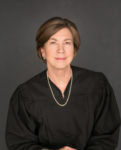 Hon. Kate M. Fox
Hon. Kate M. Fox
Admitted to Practice: August 1989
Appointed to Bench: January 2014
Retained: November 2024
Fox 2024 Judicial Performance Assessment Results
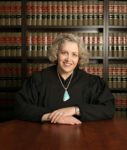 Hon. Lynnette J. Boomgaarden
Hon. Lynnette J. Boomgaarden
Admitted to Practice: August 1991
Appointed to Bench: February 2018
Retained: November 2020
Boomgaarden 2024 Judicial Performance Assessment Results
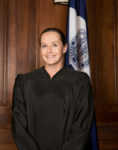 Hon. Kari Jo Gray
Hon. Kari Jo Gray
Admitted to Practice: August 1987
Appointed to Bench: October 2018
Retained: November 2020
Gray 2024 Judicial Performance Assessment Results
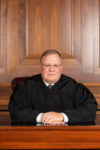 Hon. John G. Fenn
Hon. John G. Fenn
Admitted to Practice: October 1993
Appointed to District Court Bench: January 2007
Appointed to Wyoming Supreme Court: January 2022
Retained: November 2020 (District Court)
Retained: November 2024 (Supreme Court)
Fenn 2024 Judicial Performance Assessment Results
 Hon. Robert C. Jarosh
Hon. Robert C. Jarosh
Admitted to Practice: October 2001
Appointed to Wyoming Supreme Court: March 2024
Retained: Has not yet stood for retention
Jarosh 2024 Judicial Performance Assessment Results
DISTRICT COURT JUDGES' PERFORMANCE ASSESSMENTS
First Judicial District (Laramie County)
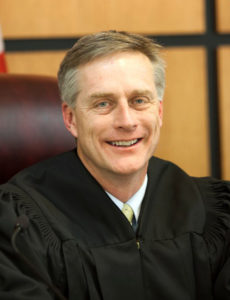 Hon. Steven K. Sharpe
Hon. Steven K. Sharpe
Admitted to Practice: August 1990
Appointed to Bench: January 2013
Retained: November 2020
Sharpe 2024 Judicial Performance Assessment Results
 Hon. Catherine R. Rogers
Hon. Catherine R. Rogers
Admitted to Practice: April 1998
Appointed to Circuit Court Bench: November 2009
Appointed to District Court Bench: April 2014
Retained: November 2022
Rogers 2024 Judicial Performance Assessment Results
 Hon. Peter H. Froelicher
Hon. Peter H. Froelicher
Admitted to Practice: September 1992
Appointed to Bench: March 2019
Retained: November 2020
Froelicher 2024 Judicial Performance Assessment Results
 Hon. Robin S. Cooley
Hon. Robin S. Cooley
Admitted to Practice: September 1992
Appointed to Bench: March 2024
Retained: Has not yet stood for retention
Cooley 2024 Judicial Performance Assessment Results
Second Judicial District (Albany & Carbon Counties)
 Hon. Dawnessa A. Snyder
Hon. Dawnessa A. Snyder
Admitted to Practice: May 2003
Appointed to Bench: July 2017
Retained: November 2024
Snyder 2024 Judicial Performance Assessment Results
 Hon. Misha E. Westby
Hon. Misha E. Westby
Admitted to Practice: September 1994
Appointed to Bench: November 2024
Westby 2024 Judicial Performance Assessment Results
Third Judicial District (Lincoln, Sweetwater & Uinta Counties)
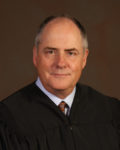 Hon. Richard L. Lavery
Hon. Richard L. Lavery
Admitted to Practice: September 1981
Appointed to Bench: July 2012
Retained: November 2020
Lavery 2024 Judicial Performance Assessment Results
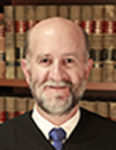 Hon. Joseph B. Bluemel
Hon. Joseph B. Bluemel
Admitted to Practice: September 1986
Appointed to Bench: January 2015
Retained: November 2022
Bluemel 2024 Judicial Performance Assessment Results
 Hon. Suzannah G. Robinson
Hon. Suzannah G. Robinson
Admitted to Practice: October 2006
Appointed to Bench: October 2019
Retained: November 2020
Robinson 2024 Judicial Performance Assessment Results
 Hon. James C. Kaste
Hon. James C. Kaste
Admitted to Practice: November 1998
Appointed to Bench: November 2024
Kaste 2024 Judicial Performance Assessment Results
Fourth Judicial District (Johnson & Sheridan Counties)
 Hon. Darci A.V. Phillips
Hon. Darci A.V. Phillips
Admitted to Practice: October 2008
Appointed to Bench: April 2022
Retained: November 2024
D. Phillips 2024 Judicial Performance Assessment Results
 Hon. Benjamin S. Kirven
Hon. Benjamin S. Kirven
Admitted to Practice: October 2004
Appointed to Bench: July 2022
Retained: November 2024
Kirven 2024 Judicial Performance Assessment Results
Fifth Judicial District (Big Horn, Hot Springs, Park & Washakie Counties)
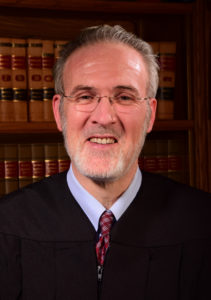 Hon. William L. Simpson
Hon. William L. Simpson
Admitted to Practice: April 1984
Appointed to Bench: August 2017
Retained: November 2024
Simpson 2024 Judicial Performance Assessment Results
 Hon. Bobbi D. Overfield
Hon. Bobbi D. Overfield
Admitted to Practice: November 2002
Appointed to Bench: October 2018
Retained: November 2020
Overfield 2024 Judicial Performance Assessment Results
Sixth Judicial District (Campbell, Crook & Weston Counties)
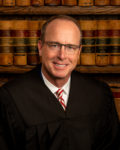 Hon. Stuart S. Healy, III
Hon. Stuart S. Healy, III
Admitted to Practice: January 1997
Appointed to Bench: December 2020
Retained: November 2022
Healy 2024 Judicial Performance Assessment Results
 Hon. James M. Causey
Hon. James M. Causey
Admitted to Practice: November 2002
Appointed to Bench: November 2024
Causey 2024 Judicial Performance Assessment Results
 Hon. Matthew F.G. Castano
Hon. Matthew F.G. Castano
Admitted to Practice: October 1995
Appointed to Circuit Court Bench: July 2014
Appointed to District Court Bench: March 2022
Retained: November 2020 (Circuit Court)
Retained: November 2024 (District Court)
Castano 2024 Judicial Performance Assessment Results
 Hon. Michael J. McGrady
Hon. Michael J. McGrady
Admitted to Practice: October 2006
Appointed to Bench: August 2024
Recently appointed: Not eligible for assessment
Seventh Judicial District (Natrona County)
 Hon. Catherine E. Wilking
Hon. Catherine E. Wilking
Admitted to Practice: October 1996
Appointed to Bench: February 2011
Retained: November 2024
Wilking 2024 Judicial Performance Assessment Results
 Hon. Daniel L. Forgey
Hon. Daniel L. Forgey
Admitted to Practice: November 1997
Appointed to Circuit Court Bench: January 2007
Appointed to District Court Bench: August 2013
Retained: November 2020
Forgey 2024 Judicial Performance Assessment Results
 Hon. Kerri M. Johnson
Hon. Kerri M. Johnson
Admitted to Practice: October 1996
Appointed to Bench: January 2019
Retained: November 2020
Johnson 2024 Judicial Performance Assessment Results
 Hon. Joshua C. Eames
Hon. Joshua C. Eames
Admitted to Practice: October 2013
Appointed to Bench: November 2024
Eames 2024 Judicial Performance Assessment Results
Eighth Judicial District (Converse, Goshen, Niobrara & Platte Counties)
 Hon. F. Scott Peasley
Hon. F. Scott Peasley
Admitted to Practice: April 2001
Appointed to Bench: August 2017
Retained: November 2024
Peasley 2024 Judicial Performance Assessment Results
 Hon. Edward A. Buchanan
Hon. Edward A. Buchanan
Admitted to Practice: November 1998
Appointed to Bench: November 2024
Buchanan 2024 Judicial Performance Assessment Results
Ninth Judicial District (Fremont, Sublette & Teton Counties)
 Hon. Jason M. Conder
Hon. Jason M. Conder
Admitted to Practice: October 2001
Appointed to Bench: July 2019
Retained: November 2020
Conder 2024 Judicial Performance Assessment Results
 Hon. Melissa M. Owens
Hon. Melissa M. Owens
Admitted to Practice: December 2000
Appointed to District Court Bench: January 2022
Retained: November 2024
Owens 2024 Judicial Performance Assessment Results
 Hon. Katharine G. McKay
Hon. Katharine G. McKay
Admitted to Practice: October 2007
Appointed to Bench: January 2023
Retained: November 2024
McKay 2024 Judicial Performance Assessment Results
CIRCUIT COURT JUDGES' PERFORMANCE ASSESSMENTS
First Judicial District (Laramie County)
 Hon. Thomas L. Lee
Hon. Thomas L. Lee
Admitted to Practice: January 1987
Appointed to District Court Bench: August 2014
Retained: November 2020
Lee 2024 Judicial Performance Assessment Results
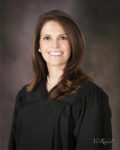 Hon. Antoinette Williams
Hon. Antoinette Williams
Admitted to Practice: November 2001
Appointed to Bench: December 2014
Retained: November 2024
Williams 2024 Judicial Performance Assessment Results
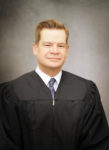 Hon. Sean C. Chambers
Hon. Sean C. Chambers
Admitted to Practice: October 2005
Appointed to Bench: July 2020
Retained: November 2022
Chambers 2024 Judicial Performance Assessment Results
Second Judicial District (Albany & Carbon Counties)
 Hon. Susan K. Stipe
Hon. Susan K. Stipe
Admitted to Practice: September 1999
Appointed to Bench: February 2018
Retained: November 2024
Stipe 2024 Judicial Performance Assessment Results
 Hon. Robert J. Sanford
Hon. Robert J. Sanford
Admitted to Practice: May 2008
Appointed to Bench: July 2020
Retained: November 2022
Sanford 2024 Judicial Performance Assessment Results
Third Judicial District (Lincoln, Sweetwater & Uinta Counties)
 Hon. Michael L. Greer
Hon. Michael L. Greer
Admitted to Practice: September 1983
Appointed to Bench: July 2006
Retained: November 2024
Greer 2024 Judicial Performance Assessment Results
 Hon. John R. Prokos
Hon. John R. Prokos
Admitted to Practice: April 1996
Appointed to Bench: June 2013
Retained: November 2022
Prokos 2024 Judicial Performance Assessment Results
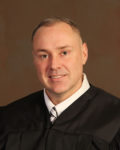 Hon. Craig L. Jones
Hon. Craig L. Jones
Admitted to Practice: September 1997
Appointed to Bench: August 2013
Retained: November 2022
Jones 2024 Judicial Performance Assessment Results
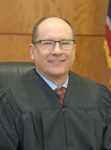 Hon. Gregory S. Corpening
Hon. Gregory S. Corpening
Admitted to Practice: August 1991
Appointed to Bench: May 2019
Retained: November 2024
Corpening 2024 Judicial Performance Assessment Results
Fourth Judicial District (Johnson & Sheridan Counties)
 Hon. Sheryl Smith Bunting
Hon. Sheryl Smith Bunting
Admitted to Practice: April 1996
Appointed to Bench: January 2024
Retained: Has not yet stood for retention
Bunting 2024 Judicial Performance Assessment Results
Fifth Judicial District (Big Horn, Hot Springs, Park & Washakie Counties)
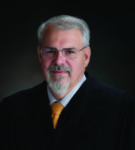 Hon. Edward G. Luhm
Hon. Edward G. Luhm
Admitted to Practice: September 1986
Appointed to Bench: January 2019
Retained: November 2024
Luhm 2024 Judicial Performance Assessment Results
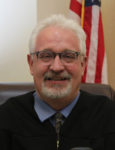 Hon. S. Joseph Darrah
Hon. S. Joseph Darrah
Admitted to Practice: October 1994
Appointed to Bench: December 2021
Retained: November 2024
Darrah 2024 Judicial Performance Assessment Results
Sixth Judicial District (Campbell, Crook & Weston Counties)
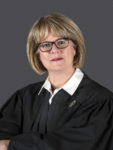 Hon. Wendy M. Bartlett
Hon. Wendy M. Bartlett
Admitted to Practice: August 1990
Appointed to Bench: July 2010
Retained: November 2024
Bartlett 2024 Judicial Performance Assessment Results
 Hon. Paul S. Phillips
Hon. Paul S. Phillips
Admitted to Practice: May 2005
Appointed to Bench: January 2017
Retained: November 2022
P. Phillips 2024 Judicial Performance Assessment Results
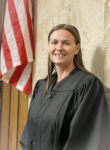 Hon. Lynda R. Bush
Hon. Lynda R. Bush
Admitted to Practice: September 2014
Appointed to Bench: May 2022
Retained: November 2024
Bush 2024 Judicial Performance Assessment Results
Seventh Judicial District (Natrona County)
 Hon. Brian D. Christensen
Hon. Brian D. Christensen
Admitted to Practice: September 1984
Appointed to Bench: February 2014
Retained: November 2024
Christensen 2024 Judicial Performance Assessment Results
 Hon. Nichole R. Collier
Hon. Nichole R. Collier
Admitted to Practice: April 2004
Appointed to Bench: July 2022
Retained: November 2024
Collier 2024 Judicial Performance Assessment Results
 Hon. Kevin D. Taheri
Hon. Kevin D. Taheri
Admitted to Practice: October 1997
Appointed to Bench: September 2023
Retained: November 2024
Taheri 2024 Judicial Performance Assessment Results
Eighth Judicial District (Converse, Goshen, Niobrara & Platte Counties)
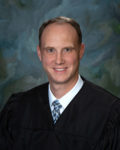 Hon. Nathaniel S. Hibben
Hon. Nathaniel S. Hibben
Admitted to Practice: November 2009
Appointed to Bench: July 2019
Retained: November 2024
Hibben 2024 Judicial Performance Assessment Results
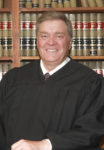 Hon. Clark C. Allan
Hon. Clark C. Allan
Admitted to Practice: September 1989
Appointed to Bench: January 2021
Retained: November 2022
Allan 2024 Judicial Performance Assessment Results
Ninth Judicial District (Fremont, Sublette & Teton Counties)
 Hon. Jefferson B. Coombs
Hon. Jefferson B. Coombs
Admitted to Practice: November 2011
Appointed to Bench: October 2021
Retained: November 2022
Coombs 2024 Judicial Performance Assessment Results
 Hon. Daniel M. Stebner
Hon. Daniel M. Stebner
Admitted to Practice: November 2011
Appointed to Bench: February 2023
Retained: November 2024
Stebner 2024 Judicial Performance Assessment Results
 Hon. John P. LaBuda
Hon. John P. LaBuda
Admitted to Practice: September 1992
Appointed to Bench: October 2023
Retained: November 2024
LaBuda 2024 Judicial Performance Assessment Results
 Hon. Erin E. Weisman
Hon. Erin E. Weisman
Admitted to Practice: May 2001
Appointed to Bench: August 2024
Recently appointed: Not eligible for assessment
Questions? Contact Sharon Wilkinson, Executive Director, at (307) 432-2102.